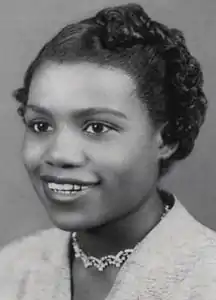Alberta Odell Jones
Alberta Odell Jones (November 12, 1930 – August 5, 1965) was an African-American attorney and civil rights icon. She was one of the first African-American women to pass the Kentucky bar and the first woman appointed city attorney in Jefferson County.[1] She was murdered by an unknown person.
Alberta Odell Jones | |
|---|---|
 | |
| Born | November 12, 1930 |
| Died | August 5, 1965 (aged 34) Louisville, Kentucky |
| Nationality | American |
| Alma mater | Louisville Municipal College Howard University School of Law |
| Occupation | Attorney, Activist |
Education
Jones graduated from Louisville Central High School and went to the Louisville Municipal College (LMC) for Black people. LMC later merged with the University of Louisville during desegregation and Jones graduated third in her class. She attended the University of Louisville Law School for one year, transferring to Howard University School of Law for her degree, graduating fourth in her class.[2]
After graduating she began practicing law and took on a prominent client early in her career, a young boxer who later changed his name from Cassius Clay to Muhammed Ali, introducing him to trainer Archie Moore of California. She was appointed in February 1965 to the Louisville Domestic Relations Court, where she was a prosecutor.[2]
Activist
Jones was active in the civil rights movement, taking part in protest marches in Louisville and attending the March on Washington in August 1963. Upon returning from Washington she formed the Independent Voters Association of Louisville and was very involved with the Louisville chapter of the Urban League. She rented voting machines and taught African Americans how to use the machines to vote. She was also active in the National Association for the Advancement of Colored People. Another of her causes was a fundraising effort to pay the medical bills of a young man, James "Bulky" Welch, who lost his arms saving his dog trapped under a train, purchasing him prosthetic arms by auctioning a car.[3]
Unsolved murder
Her killing was first attributed to drowning and her body was retrieved from the Ohio River. However, her car was found several blocks from the Sherman Minton Bridge with blood inside and a subsequent autopsy determined that she had been subjected to several severe blows to the head before entering the water. Her killing was never solved.[4]
The belated murder investigation by Louisville police contributed to her murder never being solved. The follow-up police investigation determined that she had been beaten unconscious with a brick and witnesses recalled seeing a body tossed by three unidentified men from the bridge, where her purse was later found.[5]
In 2017, efforts were made to reopen the Jones case and it became a cause célèbre. Detectives involved in the initial investigation were interviewed in the hope that new leads had surfaced over the 52 years since the killing.[6] Professor and attorney Lee Remington, who was doing research for a biography, found clues to the murder and sent a letter to the Louisville police, who agreed to reopen the case. The civil rights division of the Department of Justice also began an investigation. The investigation is funded by a new law, the Emmett Till Unsolved Civil Rights Crime Act, which provides $13.5 million annual funds to the Department of Justice, the Federal Bureau of Investigation, and state and local law enforcement agencies to investigate and prosecute pre-1970 killings.[7]
See also
References
- Gabriel, Trip (September 19, 2017). "A 'Quest for Justice' for a Murdered Civil Rights Pioneer, 52 Years Later" – via NYTimes.com.
- "Jones, Alberta O." Notable Kentucky African Americans Database. University of Kentucky. Retrieved April 13, 2019.
- Sonka, Joe (October 9, 2017). "Alberta Jones banner unveiled in downtown Louisville".
- "The 52-year mystery of Alberta Jones' murder covered on front page of The New York Times". Insider Louisville. September 20, 2017. Retrieved February 13, 2019.
- "Who killed Alberta Jones, Louisville's first black female prosecutor?". The Washington Post. October 9, 2017. Retrieved February 13, 2019.
- "Inside Investigations: Who Killed Alberta Jones?". WHAS11.
- Lee, Felicia R. (October 3, 2008). "Seeking Justice for Victims of Terror Long Ago". The New York Times.